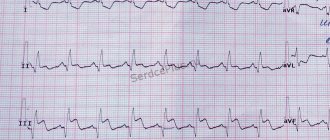© Author: Z. Nelly Vladimirovna, doctor of the first qualification category, especially for SosudInfo.ru (about the authors)
Chronic fatigue or CFS (chronic fatigue syndrome), whichever is more convenient for you, is a fairly common expression in medical and paramedical circles, which is used to describe a number of pathological conditions, as one of the symptoms, but is practically never found as an independent diagnosis. Our close neighbors, the Belarusians, aptly and succinctly characterize chronic fatigue: “agulnaya mlyavatstsya i abyyakavastsya da zhytstsya,” which translated means: “general lethargy (weakness) and indifference (indifference) to life.” Meanwhile, behind a short phrase lies a wide range of not only symptoms, but also the causes that cause them. One thing is clear - experiencing constant fatigue, a person loses interest in active work and in life in general.
Chronic fatigue syndrome
Chronic fatigue syndrome appeared as an independent pathology only at the end of the last century (1988) , although, despite this, it has not yet become a separate nosological entity. This does not mean that symptoms of the disease have not yet been encountered, and there were no people who felt constant, unmotivated fatigue. It’s just that CFS was called differently (a symptom of post-viral asthenia) and it was one of the symptoms belonging to such a (also quite common) disease as neurasthenia. In general, the name of the disease for many years caused heated debate in the scientific world, which, in the end, decided, calling the condition chronic fatigue syndrome and immune dysfunction.
There is probably no person in the world who, at some periods of his life, has not experienced complete powerlessness, emptiness, and a reluctance not only to make any physical movements, but also to simply speak. All this may be normal after hard physical work or a nervous, hectic day spent with a lot of mental stress. But if a person leaves bed in the morning already broken and tired, and this continues day after day, month after month, then the latter is a bad sign.
With chronic fatigue, the reluctance to continue any activity appears immediately after a night's sleep (usually inadequate, with frequent interruptions), so in the morning the body sends signals to the owner that he is not ready to start work, since, having assumed a vertical position, he has already become exhausted.
Often, patients involuntarily make this diagnosis themselves, describing their condition when meeting with friends or at a doctor’s appointment. When asked about their well-being, many, without hesitation, state that they have constant fatigue, which has recently become so exhausting that living and working has become unbearably difficult. Having heard such an answer from a person who always walked through life with optimism, was distinguished by a wide range of interests, high ability to work, the desire to constantly do something, set tasks and solve them brilliantly, the interlocutor who is familiar with chronic fatigue syndrome will most likely suspect him . And if he is a doctor, then the range of questions for the patient will expand (how long does he feel a loss of strength, what is the reason for his current condition, what other symptoms, besides constant fatigue, do not allow him to live?).
How to live without getting tired: prevention of chronic fatigue
The “gold standard” for the prevention of CFS is a balanced diet, moderate physical and mental activity (“take the burden with you…”), meticulous adherence to a properly structured daily routine, and avoidance (if possible, naturally) of stressful situations. If one of the components of prevention is missing (stress, forced hard physical work, etc.), you should take a good rest in order to recharge your energy batteries. During any (mental and physical) work, it is useful to give yourself a break. If the work is sedentary, then the break should not be “nicotine”: it is better to do a couple of light gymnastic exercises. A change of impressions is very useful: it can be useful to get out of town on the weekend.
What can you learn from questioning and inspection?
As a rule, when clarifying the medical history of a patient who complains of constant fatigue, depression, bad mood and low ability to work, it is possible to identify signs of CFS:
- Chronic fatigue, which exists constantly for six months or more, and does not depend on how much time a person rests (sleep for a day, but gets up as if “unloading the carriages overnight”). Muscle fatigue is manifested by weakness in the limbs (“arms and legs do not obey well”), imbalance, imprecision, clumsiness of movements, disturbance of rhythm;
- Fatigue affects not only the body, the head also suffers to a large extent: headaches, impaired memory and attention, forgetfulness (especially short-term memory), lethargy, absent-mindedness, problems with thinking, loss of the ability to set specific goals and complete assigned tasks. This creates obstacles to normal intellectual work, which is quite sad if the patient’s professional activity requires a high speed of thinking and great mental stress (for a person with mental work, even quit his job - he feels professionally unsuitable);
- Borderline neuropsychic state, expressed by depression, depression, irritability , intolerance towards loved ones and colleagues (“nerves are on edge”, “eyes are wet”, “everything drives you crazy”);
- The picture of chronic fatigue is very often complemented by sleep disturbances - a night spent in nightmares, accompanied by profuse sweating, quickly jumps into a difficult morning and daylight, forcing you to get up, go to work and begin your official duties. However, weakness and drowsiness interfere with this process, since the patient does not show proper activity - he is lethargic, sleepy, lethargic, unfriendly, angry at everyone and everything;
- Diffuse dull, aching, tolerable, but not allowing you to forget about yourself for a minute, pain throughout the body: in the muscles (myalgia), in the joints (arthralgia), which, however, do not swell and do not change the color of the skin;
- The enlargement of the cervical, submandibular, axillary and other lymph nodes (generalized lymphadenopathy) with some pain is alarming, which makes one suspect a disorder in the immune system, which, in principle, is confirmed after diagnostic measures have been taken. Sometimes there is an enlargement of the spleen;
- Concerns are caused by loss of appetite, weight loss against a person's wishes (without dieting), pale skin and the appearance of premature wrinkles - this symptom is the first to be noticed by female patients, who are especially upset by wrinkles;
- Among the common symptoms of chronic fatigue, experts note an increase in body temperature to subfebrile values (37.4 - 37.9 ° C), which is manifested by constant chills (the patient is cold all the time, he tries to wrap himself up and take cover).
Considering that symptoms of chronic fatigue often appear after a cold, after visiting a doctor the patient may receive such a vague diagnosis as a fever of unknown origin (after all, everything seems to be normal in all organs?) or some kind of chronic inflammatory process of unknown localization and etiology.
Methods of complex therapy
When diagnosed, people are faced with the question of how to overcome chronic fatigue. This is quite difficult to do and the process can be lengthy. And to achieve a positive effect, you need to use several therapeutic methods at once. But self-medication is not recommended. Only a doctor should decide how to treat chronic fatigue, selecting an individual technique for each patient.
Work and rest schedule
For successful treatment of chronic fatigue syndrome, it is necessary to pay attention to the work and rest regime. The following aspects need to be taken into account in this matter:
- Set a daily routine. It is advisable to wake up, eat, exercise, and go to bed at the same time every day.
- Sleep at least 8 hours a day. In this case, it is optimal not to get up later, but to go to bed earlier. The most suitable time for sleep is from 22:00 to 06:00.
- Don't overload your body. Physical activity must be distributed evenly. It is advisable to take breaks for a while to rest. Also, you should not overload your brain - in the case of work related to mental activity, you must regularly perform physical activity.
- Take breaks between physical and mental activities.
A stable daily routine will help you adapt to increased stress, and even lack of sleep. Therefore, the regime is what needs to be done first.
Psychotherapy
If you need to get rid of chronic fatigue, psychotherapy will help. This is an effective method of getting rid of numerous psychological disorders.
Psychotherapy is a method of treating chronic fatigue
In particular, cognitive behavioral therapy is carried out. It is a model of psychotherapy that is used to treat chronic conditions associated with pain and fatigue. This technique can be used alone or in combination with other therapeutic methods.
It has been proven that the use of psychotherapy increases the effectiveness of treating chronic fatigue by 40%. But to get the effect, you must complete the course of treatment to the end. Psychotherapy methods include hypnosis, Jacobson muscle relaxation and other methods. Treatment can only be carried out by a qualified specialist.
Medications
After the diagnosis, the doctor decides how to deal with chronic fatigue. Various medications can be used for this. But the patient must follow the doctor’s exact dosage and follow the course of treatment. Otherwise, some complications may develop.
To cope with chronic fatigue, the following groups of medications can be prescribed:
- Immunostimulants. They stimulate the functioning of cellular and humoral immunity and increase the body's resistance to disease. Pyrimidine derivatives, imidazoline derivatives, nucleic acid derivatives and other drugs can be used.
- Glycine. Prescribed to normalize metabolic processes in the body. This drug also reduces psycho-emotional stress and improves mental abilities.
- Antidepressants. They have a sedative effect, reduce anxiety, and normalize sleep. Such drugs can only be taken as prescribed by the attending physician.
- Anxiolytics. These are psychotropic drugs that suppress anxiety, fear, and emotional stress. The drugs have a very pronounced effect, so they are prescribed only in extreme cases.
- Vitamins for chronic fatigue. Necessary for getting a sufficient amount of nutritional components into the body. Vitamin complexes may be used or individual vitamins may be prescribed.
Drug therapy is quite effective on its own. But it is recommended to use it in combination with other therapeutic methods.
Hydrotherapy and physiotherapy
For chronic fatigue in women and men, physiotherapy methods are used. In particular, the following are prescribed:
- Soothing massage. Relieves muscle tension, soothes, normalizes blood circulation.
- Acupuncture. This is a method in which I apply special needles to certain points of the body. Allows you to reduce pain and calm the central nervous system.
- Exercise therapy. A set of exercises is carried out aimed at restoring energy metabolism and relieving muscle tension.
- Hydrotherapy is an effective treatment for chronic fatigue in men and women that involves applying water to the body. This technique eliminates tension and headaches. Has a relaxing effect on the body.
Soothing massage is a method of treating chronic fatigue.
Only one of the above methods or several in combination can be prescribed.
Diet therapy
Diet therapy is something that can be done at home for chronic fatigue. To cope with increased fatigue, you must adhere to the following rules:
- Don't overeat. This can make you sleepy.
- Fortify your diet. To do this, include fresh vegetables and fruits in the summer, and dietary supplements, multivitamins or mineral supplements in the winter.
- Avoid anemia. Women may develop anemia due to monthly blood loss during menstruation, a characteristic symptom of which is constant fatigue. To avoid this, you need to include porcini mushrooms, liver, parsley, eggs and other iron-rich foods in your diet.
You can't overdo diets. A sufficient amount of nutrients must enter the body. Their lack can cause chronic fatigue.
Folk remedies for chronic fatigue
To reduce the severity of symptoms of chronic fatigue, you can use the following folk remedies:
- Combine 100 g of natural honey and 15 ml of apple cider vinegar. Take 1 tsp. prepared product daily. After 10 days you should notice an improvement in your well-being.
- Cut the ginger root into slices. Pour 100 g of product into 500 ml of vodka. Leave for 7 days, shaking the container daily. After this, strain the tincture. Take 1 tsp. twice a day for a month.
- Combine 50 g of cinnamon with 500 ml of vodka. Leave for 3 weeks in a dark place. Take the resulting product 1 tbsp. once a day for a month.
- Take equal amounts of dried fruits, walnuts and lemon zest. Grind in a blender. Add honey until you get a thick paste. Take this remedy 1 tbsp. daily on an empty stomach.
- Pour 150 g of oats with a liter of boiling water. Cook over low heat until the liquid becomes viscous. Strain, add the same amount of boiled milk and 1 tsp to the broth. honey Drink this drink in the morning on an empty stomach.
Folk remedies are quite effective. But before using them, you need to make sure that there is no allergy to their components.
Who gets tired more?
Despite the fact that fatigue syndrome has acquired some independence and has become almost a diagnosis, the reasons for its formation have remained a closely guarded secret, however, it has been noted that certain categories of people are more susceptible to developing a pathological condition:
- Residents of megacities, as well as environmentally disadvantaged areas (increased levels of radiation, high concentrations of chemicals);
- Although the disease can affect both very young and very old people, the greatest likelihood of its development is between 20-40 years, and women make up the vast majority of those affected;
- More often than other professions, among patients with chronic fatigue are people who have chosen the specialty of a teacher or doctor;
- The presence of constant psycho-emotional overload significantly aggravates the situation (CFS develops earlier and more often).
The body, responding to the adverse effects of the listed factors, primarily relies on the active and coordinated interaction of individual systems: nervous, hypothalamic-pituitary-adrenal and immune. The coordinated relationships between these systems for the time being maintain some kind of balance and determine the normal resistance of the body, but the long-term presence of disturbing factors weakens the defenses, and the body begins to give up. This is where the mechanism for the development of increased fatigue syndrome and neuroimmunoendocrine syndrome is launched, which will become the foundation for the formation of the described pathological process (CFS).
Causes
There is no officially recognized cause for the development of chronic fatigue syndrome. There are theories:
- Immune theory. Patients with chronic fatigue syndrome often experience allergic reactions and signs of immunodeficiency. Conclusion: CFS develops against the background of impaired immune function.
- Infectious theory. The disease is often observed after exposure to infectious diseases: herpes viruses, Epstein-Barr, influenza, retrovirus, Coxsackie virus, Borna disease virus.
- Endocrine theory. Patients often experience disorders of the hypothalamic-pituitary-adrenal axis. Patients experience a decrease in cortisol levels and fluctuations in the level of adrenocorticotropic hormone.
- Exchange theory. In patients with chronic fatigue syndrome, acetylcarnitine levels are reduced. Its activity in the prefrontal cortex decreases: the capture of a natural substance, a relative of vitamin B, is disrupted.
- The theory of brain dysfunction. Patients with this disease show changes on magnetic resonance imaging. The photographs show abnormal defects in the form of dots and streaks. This proves the assumption that chronic fatigue syndrome is not only a functional, but also an organic disorder.
In addition to theories, the following factors contribute to the development of chronic fatigue syndrome:
- monotonous, exhausting work;
- harmful ecological environment in the place of residence;
- periodic stress;
- sedentary lifestyle;
- poor diet;
- lack of vital interests, hobbies;
- lack of life goals.
Assumptions and facts
As for the etiology and pathogenesis of chronic fatigue syndrome in more specific terms, there are currently a number of theories regarding the causes and mechanisms of development of its occurrence:
- Persistence and then activation of viral, bacterial, fungal, parasitic infections, one way or another, leads to a weakening of the body's resistance. Among the infectious agents that act as a causative factor that weakens the immune system, the most aggressive are herpes viruses and, especially, the Epstein-Barr virus, which is known to be an opportunistic pathogen, that is, causing a wide range of diseases.
- There is an opinion that hereditary predisposition plays a significant role in the development of chronic fatigue. The human immune system, genetically programmed for weak protection, finds itself in an unfavorable situation (increased background radiation, toxic effects of chemicals, stress, infection), quickly weakens and loses the ability to give an adequate response.
- Suffering from IS deprives it of the ability to fight infectious agents living in the body, which, sensing “freedom” and the absence of restraining factors, begin to become more active, triggering neuroimmune processes, thereby upsetting the regulatory abilities of the nervous system - hence the neuropsychological disorders characteristic of chronic fatigue syndrome.
One of the reasons for the appearance of chronic fatigue is considered to be a previous cold (influenza, ARVI, sore throat or exacerbation of chronic tonsillitis), while less importance is attached to a stressful situation. Probably, after all, an infectious agent is more harmful to the immune system than nervous strain. Meanwhile, the combination of these and other (radiation, environmental conditions, chemicals) unfavorable factors significantly increases the likelihood of developing the disease.
Description
Chronic fatigue syndrome is overworking of the body from high physical or mental stress. The disease is typical for residents of large cities who are in constant bustle and stress. The main cause of CFS is considered to be prolonged psycho-emotional stress and stress on the nervous system.
Most often, young people between 25 and 35 years old are susceptible to this pathology. This is due to the fact that at this age many do not notice the first signs of fatigue and force the body to work “for wear and tear”.
It is also noteworthy that two thirds of CFS sufferers are women. Due to increased emotionality and impressionability, representatives of the fair sex more often suffer from overwork and other neurological diseases.
Interesting to know! CFS became an independent disease only in 1998. Previously, pathology was considered as one of the symptoms of overwork.
How is such a diagnosis made?
Constant fatigue, weakness, muscle pain, low-grade fever and other symptoms characteristic of CFS can equally accompany other pathological conditions that need to be excluded or confirmed during a diagnostic search:
- Neoplasms of various localizations;
- Autoimmune processes;
- Infections;
- Mental disorders;
- Neuromuscular diseases;
- Pathology of the respiratory system, gastrointestinal tract, cardiovascular and excretory systems, as well as blood diseases;
- Intolerance to certain pharmaceuticals.
If the conditions listed above are excluded, but the symptoms of an unspecified disease remain, we can assume the presence of chronic fatigue syndrome, where the main criteria for its diagnosis include constant fatigue for a long time (more than six months) and a decrease in work activity by half (50%), that is, The patient can only do some work for about four hours.
The small diagnostic criteria, which complement the large ones and are decisive, include:
- Constant, but not high fever (usually not higher than 38.5°C);
- Long recovery time after hard (physical) work (more than a day);
- Discomfort, pain, sore throat (pharyngitis);
- Painful and enlarged up to 20 mm in diameter lymph nodes (mainly cervical and axillary);
- Weakness spreading throughout the entire muscular system of the body;
- Pain in all muscles and joints;
- Painful and unusual (different from those that were before) headaches and dizziness;
- Depression, bad mood, impaired memory and attention, difficulty in thinking;
- Nighttime insomnia and daytime sleepiness;
- Acute onset of the disease.
Of course, a verdict regarding chronic fatigue syndrome cannot be made based on one symptom; it is generally quite difficult to establish such a diagnosis, because in addition to the presence of some large and small criteria, it is necessary to take into account the number of symptoms, their ratio and the presence of other factors (etiological, for example). However, nothing terrible will happen if the patient defines the disease for himself and then, emphasizing constant fatigue, strives to get rid of it by developing a program for himself that includes a healthy lifestyle.
Treatment
Depending on the cause of CFS, a course of treatment is prescribed. Usually it consists of a whole range of measures, including medications of different groups, physiotherapy and auxiliary means.
Medication
There are 5 main groups of drugs that are prescribed for CFS:
- Vitamins. Strengthen the immune system, speed up metabolism and replenish the body's energy reserves. Most often, vitamins A, E, C and B vitamins are prescribed. Taking complete vitamin complexes is considered the most effective - the preparations Vitrum, Multi-Tabs, and Complivit are suitable for these purposes.
- Immunomodulators. Increase the body's protective functions, help fight viruses and infections. Polyoxidonium, Viferon, and Likopid are used as prophylactic agents.
- Nonstoroid anti-inflammatory drugs. Prescribed for headaches and joint pain, as well as in case of inflammatory processes in the body. It is recommended to take Ibuprofen, Ketanov, Celebrex to relieve local pain.
- Antiviral drugs. Effectively fight viruses and microbes that cause CFS. Drugs such as Derinat, Remantadine, and Anaferon fight infections.
- Psychotropic drugs. Prescribed in cases of mental disorders and depression. Antidepressants and nootropic drugs - Aminazine, Prozac, Glycine - have an effect on the central nervous system. The use of such drugs should be strictly supervised by a doctor.
Physiotherapeutic
The procedures are aimed at eliminating the symptoms of chronic fatigue, relieving stress and relaxing the body. The following procedures are effective:
- relaxing massages;
- acupuncture - a targeted effect on the body with special needles, which stimulates the central nervous system, relaxes and restores strength;
- Exercise therapy – simple physical exercises help restore blood circulation and relieve muscle tension;
- hydrotherapy – water procedures (baths, showers) have a beneficial effect on the body, relieve stress and have a relaxing effect;
- Magnetic therapy – exposure to short magnetic waves has an analgesic effect and also restores the functioning of the endocrine and immune systems.
Folk remedies
In combination with traditional medicine, it is effective to use non-traditional methods of treatment. The following recipes have a tonic and invigorating effect.
- Plantain infusion Take 10 dried leaves of the herb, chop and pour 0.5 liters of boiling water. Place the infusion in a water bath for 30 minutes. Take 2 tbsp. l 20 minutes before meals 3 times a day. The course of treatment is no more than three weeks, if necessary, repeat after 2 months.
- Ginger tea Peel a small root and chop. Add a pinch of cinnamon, 1 slice of lemon and chopped ginger to a cup. Pour boiling water over everything and let it brew for 5-7 minutes. Take hot tea in the morning for two weeks.
- Honey drink Add 1 teaspoon of honey, 1 teaspoon of apple cider vinegar and 2 drops of iodine to 1 cup of boiling water. Stir thoroughly and take in the morning. The recommended course is 7-9 days.
You can try to get rid of the problem on your own
You can try to get rid of constant fatigue on your own, if, of course, it was really formed from the “crazy” rhythm of life and the associated nervous overstrain, and not due to the etiological factors of CFS (viruses, ecology, harmful substances).
Having analyzed your lifestyle and made sure that “it is your own fault,” you need to draw up an action program for at least the next month (what if you like it?):
- Set yourself the task of strictly observing your sleep schedule. A good night's sleep (at least 7 hours) with falling asleep no later than 11 pm in a room with darkened windows but an open window and on a bed with a hard but comfortable mattress.
- Minimize the influence of external stimuli that create stressful situations, avoid conflicts whenever possible, try not to succumb to provocations, count to 10 before allowing yourself to be drawn into a “showdown.”
- Office workers are potential “victims” of chronic fatigue syndrome due to the abundance of causative factors in the office: computer, sitting position, eye strain, constant receipt of new information that requires “turning on the brain,” and lack of fresh air (air conditioning doesn’t count, It has another purpose - to cool or warm). It is advisable for office workers to look away from the monitor every 45 minutes, go outside or sit quietly in the break room, and exclude TV and social networking in the evening. Set aside time to visit the fitness center, do yoga, and try to spend your weekends doing active recreation in nature (working in the country is also not contraindicated).
- People engaged in hard physical labor, on the contrary, can afford a TV series or an interesting book in the evening; it won’t hurt them.
- Bad habits, such as alcohol, cigarettes and soft drugs, should be forgotten forever. A glass of good wine on a weekend evening or on occasion should not become a system, although, of course, it is not excluded (for those who know how to drink).
- A diet for chronic fatigue should be balanced, containing a sufficient amount of vitamins and microelements.
Tablets for chronic fatigue, which you plan to get rid of on your own, are the last thing. A psychotherapist will prescribe antidepressants, sleeping pills and other sedatives if the experiment does not work. You can take vitamins, antioxidants and drink medicinal teas purchased at the pharmacy on your own.
General recommendations
During the treatment of chronic fatigue syndrome, you should follow some recommendations.
- Eat foods rich in proteins, fats and carbohydrates. The diet should consist of foods rich in vitamins and beneficial minerals - give preference to fresh fruits and vegetables, meat, and fish. You should avoid fatty foods and fast food.
- It is recommended to undergo a course of psychotherapy. To cope with stress and anxiety, you should consult a psychologist. It will help you resolve internal conflicts, understand yourself and stop being nervous over trifles.
- Avoid TV and computer 3 hours before bedtime. They have an irritating effect on the central nervous system, which impairs sleep and causes anxiety.
- Get rid of bad habits. Drinking alcoholic beverages and smoking are stressful for the body.
- Play sports. Despite your fatigue, you should exercise at least several times a week. Start with light workouts - such activity triggers the production of endorphins and has a beneficial effect on the body.
- Establish a daily routine. Learn to properly plan your time so you can get everything done. Include daily walks in the fresh air in your regimen, eat at least 3 times a day and set times for sleep and rest.
Below in the video you can see how you can cope with CFS on your own.
Symptoms that should prompt you to visit a doctor
However, they go to the doctor for a diagnosis, so if the measures taken on their own do not help, you should go to the clinic and present your complaints. The following signs of unhealthy changes in the body may be the reason for going there:
- Constant fatigue, loss of strength;
- Weight loss, loss of appetite;
- Indifference to the surrounding world;
- Obsessive desire to drink or smoke (to calm down);
- Skin problems, allergic reactions;
- Dizziness and severe headaches;
- Decreased visual acuity, discomfort in the eyes;
- Pain in the localization of the axillary and cervical lymph nodes, which turn out to be enlarged upon palpation;
- Discomfort (sometimes pain) in the throat;
- Long-term (for a month) fatigue, weakness, lethargy, loss of strength;
- Tired appearance, unhealthy complexion;
- Increased body temperature (low-grade fever).
In most cases, based on the listed complaints, constant fatigue is included in autonomic dysfunction (VSD, NCD) and treatment is prescribed: vitamins, antioxidant complex, restorative procedures, physical therapy, it is recommended to follow a diet, sleep, and vigorous activity (taking into account the profession).
What are the types of violations?
Chronic fatigue and drowsiness can be physiological or pathological. Physiological fatigue is characterized by severe weakness, lethargy, and decreased performance. It is divided into:
- mental;
- sensory;
- physical.
With sensory fatigue, there is a decrease in the excitability of the sensory systems, as well as dysfunction. Mental is manifested in the form of a decrease in emotional tone, attention and mental performance. The patient has various kinds of complex disorders in the functioning of the nervous system.
Physical fatigue is characterized by decreased performance, as well as disruption of the functioning of various systems. The psychological type is called asthenia, and it is characterized by a peculiar psychopathological state. The person notes the presence of emotional fluctuations, fatigue, and excessive irritability.
What could it be?
If treatment and other measures taken do not help overcome chronic fatigue, then when going to the doctor again, the patient should prepare for an extensive examination, which includes:
- General clinical laboratory tests (general blood and urine tests);
- Biochemical blood test (glucose, creatinine, bilirubin, liver tests, electrolytes) + hormones;
- Immunogram;
- Temperature and blood pressure profile;
- Transcranial duplex scanning of the vessels of the neck and head;
- EEG (electroencephalogram);
- Magnetic resonance imaging (MRI) or computed tomography (CT);
- Consultation with an ophthalmologist (fundus eye), neurologist, cardiologist, gastroenterologist and other specialists;
- Psychological testing.
And even after such an examination, it is unlikely that chronic fatigue syndrome will be seen as the main diagnosis. Perhaps vegetative-vascular dystonia will remain or another pathology will be found:
- Lack of vitamins (detected by a specific laboratory test). Hypovitaminosis is manifested by a decrease in the body's resistance to infections and the development of anemia;
- Astheno-neurotic syndrome, which has a very rich symptomatology, but most often mental health suffers, hence depression, phobias, mood instability, anxiety, lethargy, sweating, loss of strength and other symptoms reminiscent of CFS;
- Encephalitis;
- Tumor;
- Viral infection (Epstein-Barr virus, adenovirus, enterovirus, etc.)
- Metabolic disorders (diabetes mellitus).
Sometimes symptoms corresponding to CFS correspond to a completely physiological condition - pregnancy. However, increased blood pressure, weight loss, and constant fatigue give reason to consult a doctor once again to prevent possible complications.
Symptoms
Chronic fatigue syndrome may not appear immediately. The patient may not even suspect that he has the disease. In addition, the symptoms are easy to confuse with ordinary fatigue. Therefore, it is very important to consult a therapist at the first suspicion of CFS.
The disease manifests itself with the following symptoms:
- a constant feeling of weakness and fatigue that does not go away even after a good sleep or long rest;
- rapid fatigue even after basic physical activity;
- pain in joints and muscles;
- disturbing sleep, insomnia;
- low concentration, absent-mindedness;
- decreased analytical abilities;
- feeling of anxiety and restlessness for no reason;
- throbbing headaches in the temporal region, possible migraines;
- irritability and short temper;
- decreased protective functions of the body, leading to frequent colds;
- exacerbation of chronic pathologies.
How and what does the doctor treat and what can you add at home?
If such an interesting diagnosis as chronic fatigue syndrome has loomed, and nothing else has been found, then treatment should be comprehensive, where the priority tasks should include eliminating the cause of pathological changes (most often, the fight against some kind of virus). Meanwhile, it is impossible not to notice the suffering of such important systems as the immune and nervous, so you need to try to strengthen and calm them.
- To strengthen the immune system, vitamins (A, B, C, D) and microelements in complex, β-carotene, succinic and folic acid are prescribed, which the cells of the immune system really need to ensure their normal functioning;
- If the relationship between individual components of immunity is disturbed, depending on the cause, the doctor prescribes immunostimulants and/or immunocorrectors . An immunogram and other blood tests will show which drugs are suitable; It is better for the patient himself not to experiment with these medications, since he needs to know exactly what causes the immunodeficiency: viruses and fungal infections feel more at ease when cellular immunity is weakened; for infections of microbial origin, the humoral immune response is more important;
- The nervous system of a patient who is accompanied throughout life by chronic fatigue, like IS, requires stabilization, so soothing tinctures (peony, valerian, motherwort), other herbal remedies, and aromatherapy will be useful;
- Both the nervous system and the immune system are equally well suited for various activities aimed at strengthening general health: diet, physical therapy, massage, acupuncture, soothing (for example, pine) baths, circular shower;
- Often, a patient with chronic fatigue syndrome needs the help of a psychotherapist. You should not be afraid of a specialist in this profile in advance (such prejudices are still alive in our society), you need to boldly go to the doctor - only he knows which synthetic antidepressants and sleeping pills will be effective in each specific case ( It’s definitely not worth making self-prescriptions here).
Treatment at home (in such cases, as a rule, a hospital stay is not provided) is often supplemented with folk remedies - infusions and decoctions of various representatives of the flora, prepared with your own hands in your kitchen, as well as some products.
After hard physical work, rose hips, lemon, and propolis restore strength well.
Intense mental work requires chocolate (bitter black), walnuts and exotic foods (avocado) - not very folk remedies, but quite tasty and uplifting. You can, however, improve your memory using other methods: grate horseradish, infuse elecampane with vodka, and consume fresh pine buds raw.
The body's resistance to infectious agents is increased by currants, honey, and rose hips.
Nervous activity is stimulated by Eleutherococcus, Rhodiola rosea, ginseng, Aralia, Manchurian, and kelp (sea kale).
Raging emotions are calmed by valerian, hawthorn, motherwort, and mint.
Folk recipes that involve infusing vodka, brewing, straining and other manipulations performed during the preparation of medicine are not always convenient (and there is no strength for anything), so people with constant fatigue are better off purchasing ready-made medicinal herbs at the pharmacy and drinking instead of tea ( chamomile, linden blossom, lemon balm) – tasty and healthy.
Video: chronic fatigue - program “Live Healthy!”
Diagnostics
Determining chronic fatigue syndrome is quite difficult, since the symptoms of the disease are very similar to a number of different pathologies. A correct diagnosis can only be made after a complete examination.
First of all, infectious diseases and allergic reactions should be excluded. To do this:
- biochemical analysis of blood and urine;
- allergic reaction test.
Next, the patient is recommended to undergo ultrasound diagnostics of the gastrointestinal tract, heart and endocrine system. If no pathologies have been identified, a consultation with a neurologist, psychotherapist and immunologist is prescribed.
Overstrain of the central nervous system, which led to the onset of chronic fatigue syndrome, is determined by collecting anamnesis and carrying out such diagnostic measures as:
- electrocardiogram;
- ECHO, ECHO of the brain;
- MRI.
If CFS occurs against the background of mental stress, stressful situations and experiences, the pathology will be treated by a psychotherapist.
In cases where the main signs of chronic fatigue are frequent colds and exacerbations of chronic diseases, it is necessary to consult an immunologist who will prescribe the optimal course of treatment.










